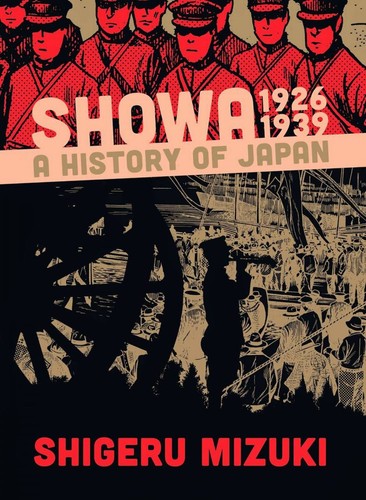el dang reviewed Showa 1926–1939 by Shigeru Mizuki (Showa: A History of Japan)
Taught me a lot, beautifully drawn, at times confusing
4 stars
Well, I was wondering if this would be a quick read because manga or slow because of the heaviness of the material. Quick won out, though it certainly is very heavy material.
It's two stories interwoven: Mizuki's personal memoir (this volume is from early childhood - young adulthood), and the history of Japan. He's a great storyteller, and the art is beautifully done. At times he editorialises explicitly, and at times intentionally lays off passing judgement. In the middle of the book this was confusing, but by the end I felt like I could understand the editorial choices he was making. It comes across as a very compassionate way to tell stories that in the end he is clearly horrified by--both the politics and some of his behaviour as a kid.
The personal memoir + history book work better together than I'd have expected in this volume. My reservations were …
Well, I was wondering if this would be a quick read because manga or slow because of the heaviness of the material. Quick won out, though it certainly is very heavy material.
It's two stories interwoven: Mizuki's personal memoir (this volume is from early childhood - young adulthood), and the history of Japan. He's a great storyteller, and the art is beautifully done. At times he editorialises explicitly, and at times intentionally lays off passing judgement. In the middle of the book this was confusing, but by the end I felt like I could understand the editorial choices he was making. It comes across as a very compassionate way to tell stories that in the end he is clearly horrified by--both the politics and some of his behaviour as a kid.
The personal memoir + history book work better together than I'd have expected in this volume. My reservations were about the combo of hindsight and childhood stories specifically (as opposed to vol 2 which will clearly be that much more personal), but the childhood stuff ends up illustrating the social atmosphere in interesting ways. My one complaint is that the timeline jumps around in ways that make sense for the personal story, but at times make the history hard to follow. Probably if I had been less clueless about Japanese history before reading this it would have been less distracting.
I'm very glad I read this, both for the enjoyment and to start filling a big hole in my knowledge. I'm looking forward to getting hold of vol 2.

